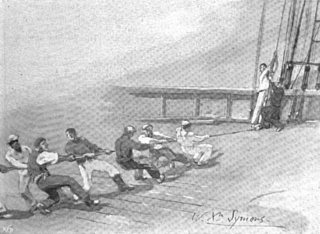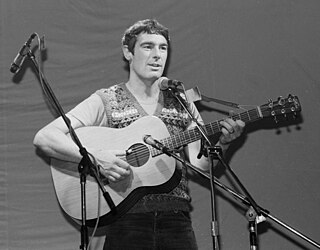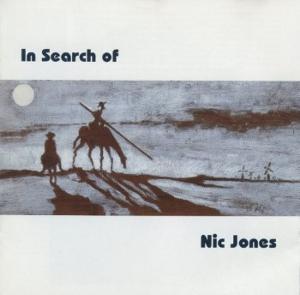Related Research Articles

A sea shanty, chantey, or chanty is a genre of traditional folk song that was once commonly sung as a work song to accompany rhythmical labor aboard large merchant sailing vessels. The term shanty most accurately refers to a specific style of work song belonging to this historical repertoire. However, in recent, popular usage, the scope of its definition is sometimes expanded to admit a wider range of repertoire and characteristics, or to refer to a "maritime work song" in general.
"The Daemon Lover" – also known as "James Harris", "A Warning for Married Women", "The Distressed Ship Carpenter", "James Herries", "The Carpenter’s Wife", "The Banks of Italy", or "The House-Carpenter" – is a popular ballad dating from the mid-seventeenth century, when the earliest known broadside version of the ballad was entered in the Stationers' Register on 21 February 1657.

Nic Jones is an English singer, songwriter and musician. Regarded as a prominent figure of the British folk revival, he has recorded five solo albums and collaborated with various musicians.
"The Black Velvet Band" is a traditional folk song collected from singers in Ireland, Australia, England, Canada and the United States describing how a young man is tricked and then sentenced to transportation to Australia, a common punishment in the British Empire during the 19th century. Versions were also published on broadsides.
"I Saw Three Ships (Come Sailing In)" is an English Christmas carol, listed as number 700 in the Roud Folk Song Index. The earliest printed version of "I Saw Three Ships" is from the 17th century, possibly Derbyshire, and was also published by William Sandys in 1833. The song was probably traditionally known as "As I Sat On a Sunny Bank", and was particularly popular in Cornwall.
"Drunken Sailor", also known as "What Shall We Do with a/the Drunken Sailor?" or "Up She Rises", is a traditional sea shanty, listed as No. 322 in the Roud Folk Song Index. It was sung onboard sailing ships at least as early as the 1830s.

Stanley James Hugill was a British folk music performer, artist and sea music historian, known as the "Last Working Shantyman" and described as the "20th century guardian of the tradition".
"Oh Shenandoah" is a traditional folk song, sung in the Americas, of uncertain origin, dating to the early 19th century.
Captain Alfred Bulltop Stormalong was an American folk hero and the subject of numerous nautical-themed tall tales originating in Massachusetts. Stormalong was said to be a sailor and a giant, some 30 feet (9.1 m) tall; he was the master of a huge clipper ship known in various sources as either the Courser or the Tuscarora, a ship purportedly so tall that it had hinged masts to avoid catching on the Moon.
Elizabeth "Bess" Cronin was an influential singer of Irish traditional music in the sean-nós style. She sang hundreds of songs which she learnt as a youth, half of which were in the Irish language, which was her first language. She was visited and recorded by prominent collectors of traditional music including Alan Lomax, Jean Ritchie, Peter Kennedy and Seamus Ennis. Some of her songs inspired popular recordings, such as her version of Siúil a Rún, which was covered by Clannad and Celtic Women.
"(The) Leaving of Liverpool", also known as "Fare Thee Well, My Own True Love", is a folk song. Folklorists classify it as a lyrical lament and it was also used as a sea shanty, especially at the capstan. It is very well known in Britain, Ireland, and America, despite the fact that it was collected only twice, from the Americans Richard Maitland and Captain Patrick Tayluer. It was collected from both singers by William Main Doerflinger, an American folk song collector particularly associated with sea songs in New York. The song's narrator laments his long sailing trip to California and the thought of leaving his loved ones, pledging to return to her one day.
"South Australia" is a sea shanty, also known under such titles as "Rolling King" and "Bound for South Australia". As an original worksong it was sung in a variety of trades, including being used by the wool and later the wheat traders who worked the clipper ships between Australian ports and London. In adapted form, it is now a very popular song among folk music performers that is recorded by many artists and is present in many of today's song books.
"Edward" is a traditional murder ballad existing in several variants, categorised by Francis James Child as Child Ballad number 13 and listed as number 200 in the Roud Folk Song Index. The ballad, which is at least 250 years old, has been documented and recorded numerous times across the English speaking world into the twentieth century.
"Bonnie Annie" is a folk ballad recorded from the Scottish and English traditions. Scottish texts are often called Bonnie Annie or The Green Banks of Yarrow, English texts are most often called The Banks of Green Willow. Other titles include The Undutiful Daughter, The High Banks O Yarrow, The Watery Grave, Green Willow, There Was a Rich Merchant that Lived in Strathdinah and The Merchant's Daughter.
"Poor Paddy Works on the Railway" is a popular Irish folk and American folk song. Historically, it was often sung as a sea shanty. The song portrays an Irish worker working on a railroad.

In Search of Nic Jones is an album by Nic Jones, released in 1998. It is a collection of remastered live recordings, performed between 1979 and 1982. The album was voted Mojo's Folk Album of the Month, August 1998.
"When Jones' Ale Was New" is an English folk song about men of various trades drinking at an ale-house or tavern. Other titles include "Joan's Ale is New" and "When Johnson's Ale Was New". Originating in the 16th century CE it has been collected frequently from traditional singers in England, and has been found occasionally in Scotland and the USA. It has evolved over the years, and is popular as a chorus song in folk clubs in England.
The Golden Glove is an English folk song also popular in Scotland, Ireland and North America. It tells the tale of a young woman who falls in love with a farmer and devises a somewhat far-fetched ruse to win his love. This song is also known as Dog and Gun and The Squire of Tamworth
"Soon May the Wellerman Come", also known as "Wellerman" or "The Wellerman", is a folk song in ballad style first published in New Zealand in the 1970s. The song refers to the "wellermen", pointing to supply ships owned by the Weller brothers, who were amongst the earliest European settlers of Otago.
"A Drop of Nelson's Blood" is a sea shanty, also known as "Roll the old chariot along" The origins are unclear, but the title comes from the line: "A drop of Nelson's blood wouldn't do us any harm". Often described as a "walkaway" or "runaway chorus" or "stamp and go" sea shanty, the song features on the soundtrack of the 2019 film Fisherman's Friends. The chorus comes from the 19th century Salvation Army hymn, 'Roll the old chariot'. This song developed into a shanty.
References
- 1 2 "On Board the Kangaroo". www.contemplator.com. Retrieved 2022-10-26.
- ↑ Baxter, John (12 November 2022). "On board o' the Kangaroo". Folk Song and Music Hall. Retrieved 24 November 2023.
- ↑ Clifton, Harry (1865). "On board of the Kangaroo". London: Hopwood & Crew. Retrieved 24 November 2023.
- ↑ Salto, Cattia (2018-04-26). "Aboard the kangaroo/The Good Ship Kangaroo". Terre Celtiche Blog (in Italian). Retrieved 2022-10-26.
- ↑ "Iron screw steamer Kangaroo, built Smith & Rodger, Govan, 1853". University of Liverpool. Retrieved 24 November 2023.
- ↑ "Search". www.vwml.org. Retrieved 2022-10-26.
- ↑ Ó Cróinín, Dáibhí, ed. (2000). The Songs of Elizabeth Cronin, Irish Traditional Singer: The Complete Song Collection. Dublin: Four Courts Press. ISBN 1- 85182-259-3.
- ↑ "On Board the Kangaroo (Roud 925; G/D 6:1211)". mainlynorfolk.info. Retrieved 2022-10-26.
- ↑ The Good Ship Kangaroo, 2014-11-17, retrieved 2022-10-26